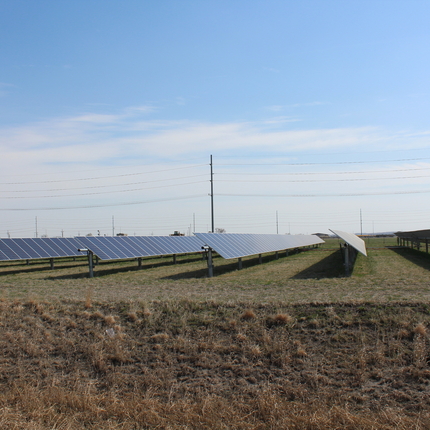The Center for Rural Affairs recently submitted a $100 million proposal to the Environmental Protection Agency's Solar for All grant competition. The Solar for All program is one component of the larger Greenhouse Gas Reduction Fund established by the Inflation Reduction Act.
The Solar for All program will make $7 billion available nationally to facilitate low-income and historically disadvantaged community participation in residential photovoltaic (solar) energy. The program is designed to deploy solar, save residential participants at least 20% on their utility bills, and transform the residential solar market.
The program is designed to save both homeowners and those who rent at least 20% on their utility bills. Our proposal would double the amount of deployed solar energy in Nebraska and would transform the residential solar market here.
If awarded, the Center would establish the Nebraska Solar for All program with the goal of ensuring that low-income and disadvantaged households in Nebraska have equitable access to solar power and the means to become owners of solar energy production.
To develop the application, Center staff met with more than 50 stakeholders including utilities, state agencies, housing developers, housing organizations, solar developers, workforce partners, community-based organizations, and Tribes. Over the course of numerous meetings, conversations, and planning sessions, participants collaboratively identified a three-part strategy that includes community solar, multi-family affordable housing solar, and rooftop solar, as well as a Tribal set-aside.
Community solar — Through our proposed community solar strategy, the Center would collaborate with public utilities in the state to support the development of residential-serving community solar arrays. Eligible residents would participate through subscriptions or through ownership of panels. A number of major and minor utilities in the state provided letters of support for the application indicating their interest in partnering with the Center on this strategy.
Multifamily affordable housing solar — This is similar to community solar, but specifically serving income-qualified multifamily housing units. Through this proposed strategy, the Center would collaborate with utilities, housing developers, and low-income housing financing partners, to deploy solar serving these housing units.
Rooftop solar — The Center’s application also includes a behind-the-meter or rooftop strategy for qualified households. Interested residents would be screened for eligibility and site suitability, and then connected to both a technical service provider and solar installer.
If awarded, the Solar for All grant would provide resources for the Center, our partners, and contractors to provide both technical and financial assistance to support each of the three strategies and to help develop the workforce to install and maintain these new installations. As submitted, the Center-led project will reach more than 15,000 households in the state and deploy more than 100 megawatts of new residential serving solar.
The three-part strategy envisioned by the Center will contribute to market transformation by catalyzing solar development across all of the major areas of the residential-serving market while ensuring low-income and historically disadvantaged residents can be full participants in the new energy economy.
Solar for All is a competitive grant application. Public announcements of awards are expected by August 2024.
Feature photo: A community solar farm in Fremont, Nebraska. | Photo by Rhea Landholm





